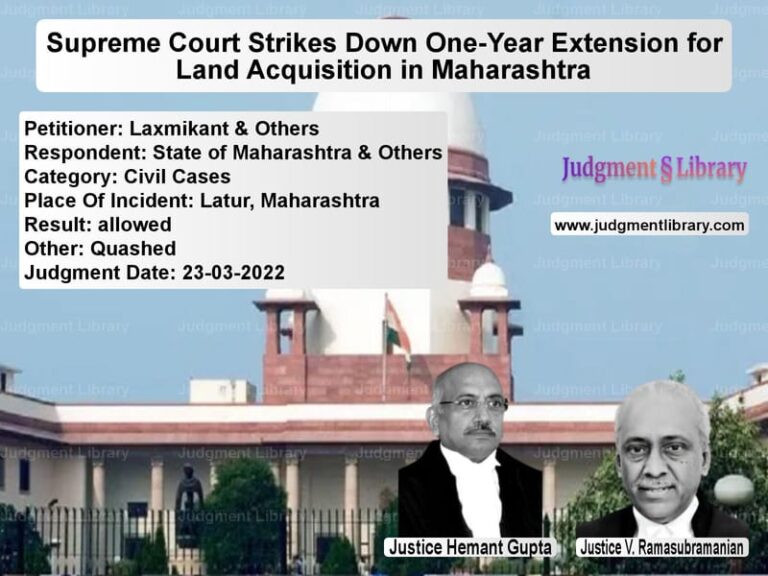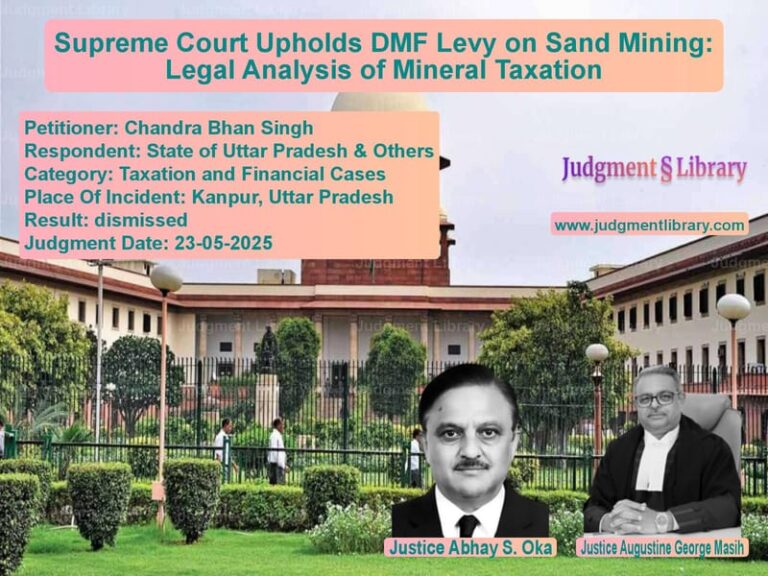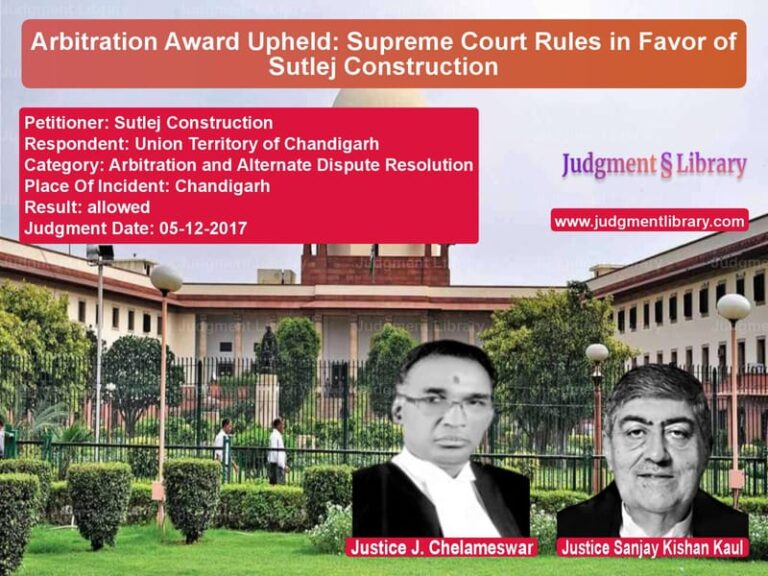Radha Bai vs. Ram Narayan: Supreme Court Rules on Hindu Succession and Ancestral Property Rights
The case of Radha Bai vs. Ram Narayan & Others revolves around a property dispute involving Hindu succession laws. The Supreme Court was called upon to decide whether the appellant, Radha Bai, had a rightful claim to ancestral property that had been partitioned and sold before her father’s death.
The judgment clarifies the interpretation of Hindu inheritance laws, particularly under the Hindu Succession Act, 1956, and sets a precedent on whether granddaughters can claim a share in ancestral property when their father predeceases the original owner.
Background of the Case
The dispute centered on a piece of land in Bilaspur, Chhattisgarh, originally owned by Sukhdeo. The legal battle began when Radha Bai, the granddaughter of Sukhdeo, filed a suit claiming her share in the ancestral property. The primary timeline of the dispute is as follows:
- Sukhdeo, the original owner, passed away in 1965, leaving behind two sons, Janakram and Pilaram.
- Radha Bai’s father, Saheblal (son of Janakram), had already passed away in 1957, before both Janakram and Sukhdeo.
- After Sukhdeo’s death, the property was partitioned in 1967 between Janakram and Pilaram.
- In 1979, Janakram sold his share of the property to his grandsons (defendants in the case).
- Radha Bai became aware of the sale in 1985 and filed a suit for partition and possession of her claimed share.
Trial Court’s Judgment
The Trial Court dismissed Radha Bai’s suit, ruling that she had no right to the property as it had already been partitioned and sold by her grandfather, Janakram, before his death. The key observations were:
- The property had already been partitioned in 1967, meaning Radha Bai’s father, Saheblal, had no claim at the time of his death.
- The sale executed by Janakram in 1979 was valid and binding.
- Radha Bai had no standing to challenge the partition or sale as she was not a direct heir at the time of succession.
First Appeal: District Court Reverses the Decision
Radha Bai appealed to the Additional District Judge, who ruled in her favor, stating:
- She had a legitimate claim to the property as a successor under Hindu inheritance laws.
- The partition in 1967 was improper as it did not include her rights.
- The sale executed in 1979 was not valid against her claim.
Second Appeal: High Court Overturns District Court’s Ruling
The defendants appealed to the Chhattisgarh High Court, which reinstated the Trial Court’s decision and ruled against Radha Bai. The High Court’s reasoning was:
- Radha Bai’s father, Saheblal, predeceased both Sukhdeo and Janakram, meaning he never acquired any legal claim over the property.
- The Hindu Succession Act, 1956, states that succession would open only upon the death of the last surviving coparcener, in this case, Janakram in 1982.
- By the time succession was relevant, the property had already been partitioned and was no longer ancestral.
- Since the property had already been sold, Radha Bai had no legal grounds to claim inheritance.
Supreme Court’s Judgment
Radha Bai appealed to the Supreme Court, arguing that she should have inherited a share in the property as per Hindu succession laws. However, the Supreme Court dismissed her appeal, agreeing with the High Court’s ruling.
1. No Right to Claim Ancestral Property Once Partitioned
- The Court held that once a property is partitioned, it ceases to be ancestral and becomes the exclusive property of the partitioned members.
- The Supreme Court ruled:
“After the death of Sukhdeo in 1965, the property devolved upon his two sons, Janakram and Pilaram. They later effected partition in 1967, making them the absolute owners of their respective shares.”
2. Hindu Succession Law Does Not Allow Granddaughters to Claim in Such Cases
- Since Radha Bai’s father, Saheblal, died in 1957, he never inherited any property.
- The Supreme Court cited legal precedents that state:
“If a person dies before succession opens, their heirs cannot inherit a right that never existed in the first place.”
3. Sale Executed by Janakram Was Legally Binding
- The Court upheld the 1979 sale of the property, ruling that once a person becomes the absolute owner of a property, they have the legal right to sell it.
- The Court stated:
“The sale executed by Janakram in 1979 was valid and binding. It could not be challenged by Radha Bai, who had no legal claim over the property.”
Impact of the Judgment
This ruling has important implications for Hindu inheritance law:
- Granddaughters Cannot Claim Ancestral Property If Their Fathers Predeceased the Original Owner: The ruling clarifies that inheritance rights are established only when the succession opens.
- Once Partitioned, Property Loses Its Ancestral Status: If a property has been divided among heirs, it ceases to be part of the joint family and becomes the absolute property of the inheritors.
- Legal Sales by Absolute Owners Cannot Be Challenged by Distant Heirs: If a rightful owner sells a property before succession is contested, the sale remains valid.
Conclusion
The Supreme Court’s ruling in Radha Bai vs. Ram Narayan reaffirms key principles of Hindu succession law. The judgment clarifies that inheritance rights do not extend to heirs whose predecessors passed away before succession opened. This case serves as an important precedent for property disputes involving Hindu Mitakshara coparcenary property and ensures that inheritance laws are interpreted correctly in future cases.
Petitioner Name: Radha Bai.Respondent Name: Ram Narayan & Others.Judgment By: Justice A.M. Khanwilkar, Justice Dinesh Maheshwari.Place Of Incident: Bilaspur, Chhattisgarh.Judgment Date: 22-11-2019.
Don’t miss out on the full details! Download the complete judgment in PDF format below and gain valuable insights instantly!
Download Judgment: Radha Bai vs Ram Narayan & Others Supreme Court of India Judgment Dated 22-11-2019.pdf
Direct Downlaod Judgment: Direct downlaod this Judgment
See all petitions in Property Disputes
See all petitions in Succession and Wills
See all petitions in Landlord-Tenant Disputes
See all petitions in Judgment by A M Khanwilkar
See all petitions in Judgment by Dinesh Maheshwari
See all petitions in dismissed
See all petitions in supreme court of India judgments November 2019
See all petitions in 2019 judgments
See all posts in Civil Cases Category
See all allowed petitions in Civil Cases Category
See all Dismissed petitions in Civil Cases Category
See all partially allowed petitions in Civil Cases Category







